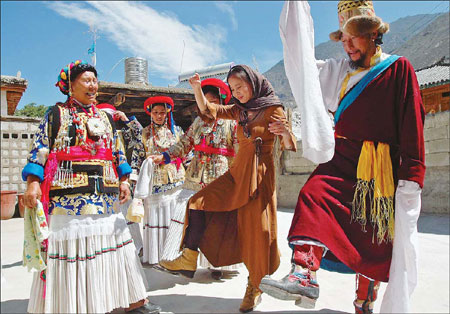
Zhu Zheqin (center) will bring Chinese ethnic legacies into a contemporary setting at her Shanghai concert. provided to china daily
Singer Zhu Zheqin has been collecting ethnic music and handicrafts to raise awareness of fading Chinese traditions, Zhang Kun reports.
Dadawa, the first Chinese singer to gain international acclaim back in the early 1990s, will give a concert at the Shanghai Grand Theatre on Oct 28.
Dadawa is the stage name of Zhu Zheqin. Zhu was named the Chinese ambassador for the United Nations Development Program (UNDP).
One of her first projects was a campaign to protect and promote ethnic handicrafts and music in China. She spent over four months traveling to ethnic regions in Guizhou, Yunnan, the Inner Mongolian autonomous region, and the Xinjiang Uygur autonomous region, making a visual and audio record of their respective music and crafts along the way.
In her upcoming concert, Zhu will bring the cream of the crop to bear for what is expected to be a wildly eclectic performance.
"My concert will not be a folk art show or an ethnic music presentation. I will bring the genes of these ethnic legacies into a contemporary setting and, hopefully, into the future," said the singer, songwriter and music producer.
"We've only had a few recitals by female singers since the theater opened 13 years ago," said Qian Shijin, artistic director of Shanghai Grand Theatre. "Zhu Zheqin is one of the privileged few to meet our artistic criteria."
Zhu said it was natural for Chinese to initially mimic Western artistic trends and study their theories.
"But now we've grown up and it's time for us to start building the 'created in China' brand, rather than the 'made in China' brand," she said at a recent press conference.
Zhu will start with two concerts in Hong Kong on Oct 15 and 16, and a show at the National Grand Theatre in Beijing on Oct 20. After performing in Shanghai on Oct 28, she will perform at the Hangzhou Grand Theatre on Nov 3.
Zhu was born in Guangzhou and studied music in Shanghai in the early 1990s.
She published her first album, The Yellow Child, in 1992 in collaboration with music professor He Xuntian. She followed this with Sister Drum in 1995, which was inspired by the music, religious and artistic legacy of Tibet.
Sister Drum brought Zhu considerable international recognition. She became the first contemporary Chinese musician to have her music released worldwide, and she received an Asian MTV award for her contribution to Asian music.
Her project with the UNDP aims to find successors to continue traditional ethnic crafts. When the crafts make a profit, 10 percent of the proceeds are reinvested into promoting the craft. Ten percent of the box office receipts from Zhu's concert will also be donated to the same cause.
